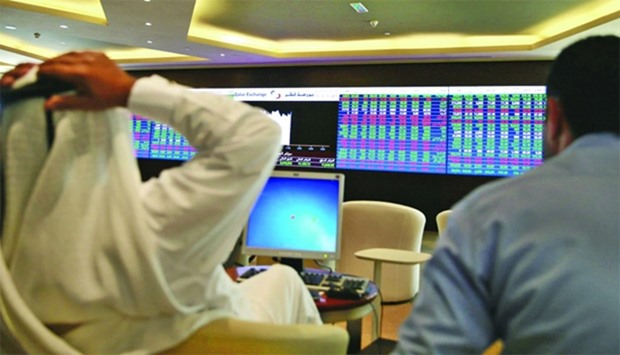The Qatar Stock Exchange on Thursday fell more than 239 points to hit a new low of less than 10,000 points and capitalisation eroded more than QR15bn, mainly on the back of a bearish grip of local retail investors.
An across the board selling – especially within the real estate, industrials and telecom counters – led the 20-stock Qatar Index to settle 2.35% lower at 9,941.69 points, also reflecting weak global oil prices.
"A dip below 10,580 points would trigger additional weaknesses to 10,200 points and may be lower to 10,000 points," a Kamco technical analysis had said, suggesting that medium-term and long-term investors can stay in the market as long as the index is closing above 10,000 points and 9,500 points, respectively.
Domestic institutions’ buying interests considerably weakened in the market, whose sensitive index has registered a 3.47% erosion year-to-date.
Market capitalisation melted 2.65% to QR565.65bn mainly owing to large and midcap segments.
Islamic equities were seen declining slower than the main index in the market, where the Gulf institutions however turned bullish.
Trade turnover and volumes were on the decline in the bourse, where the industrials and banking sectors together accounted for about 69% of the total volume.
The Total Return Index shed 2.35% to 17,599.94 points, the All Share Index by 2.82% to 3,011.44 points and the Al Rayan Islamic Index (Price) by 2.14% to 2,354.96 points.
The realty index plummeted 6.52%, industrials (4.17%), telecom (3.12%), insurance (2.33%), transport (1.85%), banks and financial services (1.35%) and consumer goods (0.47%).
About 80% of the traded stocks were in the red with major losers being Ezdan, Gulf International Services, Industries Qatar, Mazaya Qatar, Milaha, Qatari Investors Group, Qatari German Company for Medical Devices, Qatar Insurance, Qatar Islamic Bank, Commercial Bank, Salam International Investment and Islamic Holding Group; whereas QIIB, Medicare Group and Qatar Industrial Manufacturing were among the prime gainers.
Local individuals turned net sellers to the tune of QR9.06mn against net buyers of QR9.32mn on February 13.
Domestic funds’ net buying decreased significantly to QR0.75mn compared to QR20.61mn the previous day.
However, Gulf institutions’ net buying increased impressively to QR32.67mn against QR5.34mn on Wednesday.
Gulf individuals turned net buyers to the tune of QR0.52mn compared with net sellers of QR0.83mn on February 13.
Non-Qatari individual investors’ net buying strengthened marginally to QR0.49mn against QR0.4mn the previous day.
Non-Qatari institutions’ net profit-booking declined noticeably to QR25.35mn compared to QR34.87mn on Wednesday.
Total trade volume fell 9% to 8.8mn shares, value by 6% to QR286.81mn and transactions by 9% to 6,397.
The telecom sector’s trade volume plummeted 77% to 0.86mn equities, value by 55% to QR15.82mn and deals by 11% to 764.
The banks and financial services sector saw a 7% shrinkage in trade volume to 1.89mn stocks, 19% in value to QR122.86mn and 30% in transactions to 1,527.
However, the industrials sector’s trade volume soared 74% to 4.15mn shares, value by 43% to QR97.21mn and deals by 12% to 2,536.
The insurance sector reported a 63% surge in trade volume to 0.26mn equities, 42% in value to QR7.91mn and 34% in transactions to 326.
The transport sector’s trade volume shot up 56% to 0.42mn stocks and value by 84% to QR12.33mn, while deals were down 3% to 263.
There was an 11% increase in the real estate sector’s trade volume to 0.99mn shares but on an 8% fall in value to QR15.76mn and 18% in transactions to 711.
The consumer goods sector’s trade volume grew 10% to 0.23mn equities, whereas value shrank 31% to QR14.93mn and deals by 19% to 270.
In the debt market, there was no trading of treasury bills and sovereign bonds.

